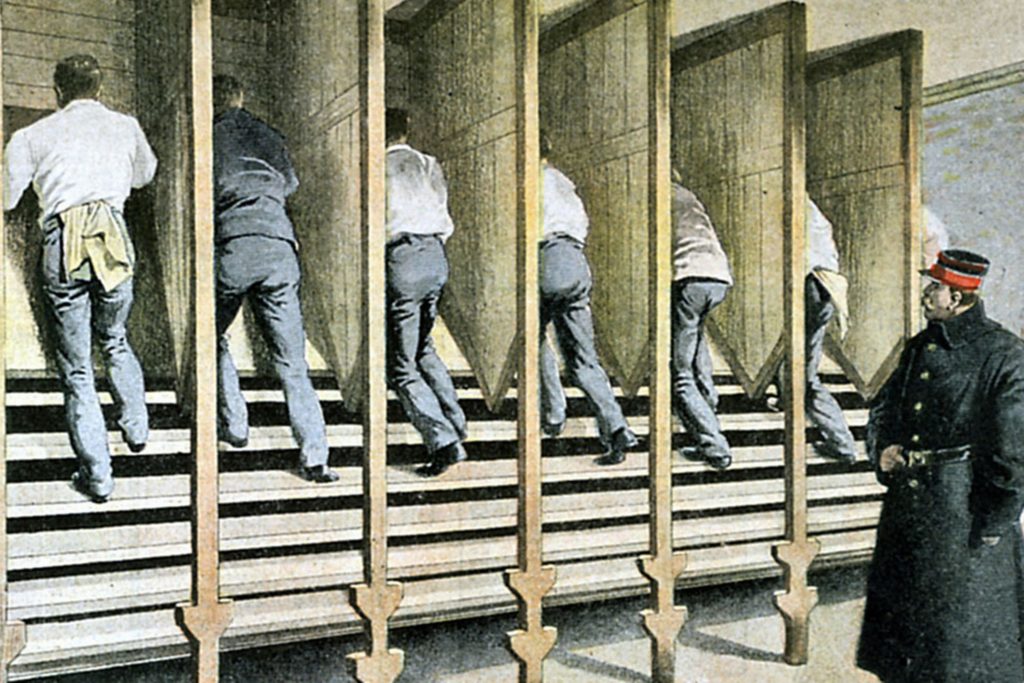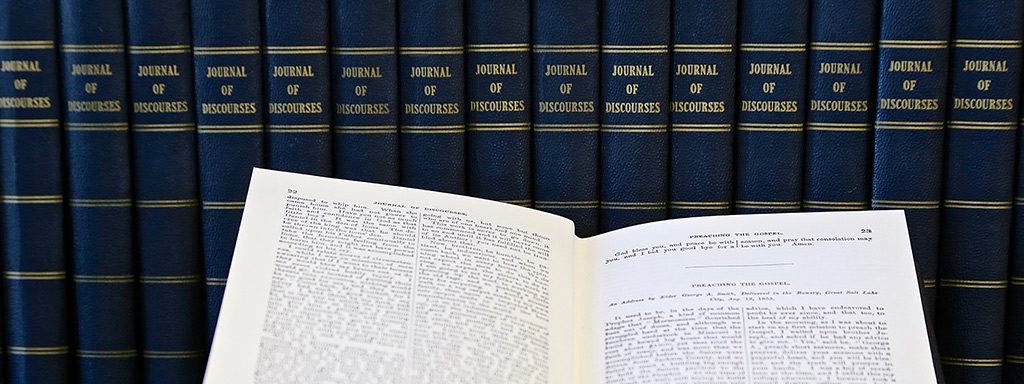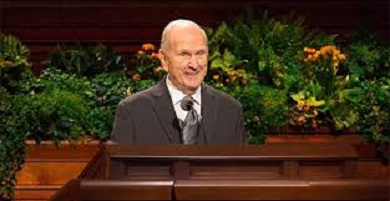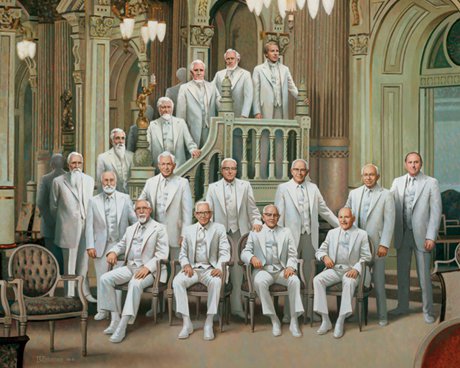1.Mormon Prophets Contradict Each Other
We begin to look at the three reasons why Mormonism doesn’t work. In this article we consider the first; Mormon prophets contradict each other.
I recently met someone from my Mormon days, someone I haven’t seen since those times almost thirty-five years ago. She remembered my wife and I teaching and encouraging her but explained that she had since left the Church. She hadn’t done anything wrong, she was quick to say, nothing deserving excommunication, but spoke of how thoroughly inadequate she felt most of the time.
‘No matter how much I did, there was always more to do,’ she said, ‘always something I wasn’t getting done, or getting done adequately.’ Finally, she walked away having decided it simply couldn’t be done.
‘That’s why we left,’ I said, ‘we realised Mormonism simply doesn’t work, doesn’t get you anywhere.’ She smiled in appreciation of fellow travellers who also got nowhere, had come to their senses, and stepped off the treadmill that is Mormonism. It is not an uncommon experience.

Particularly when you are young the world is your oyster and anything seems possible. For a young Mormon even godhood seems within reach. Everything is bright hope and vaunting ambition as you attend early morning seminary classes, dreaming of being a missionary, striving for temple worthiness, aspiring to celestial glory and being ‘added upon’i forever. With the passing of time comes the realisation this oyster is singularly difficult to prise open.
Age and experience again finds individuals compromising in their ambitions, like the middle manager who once nursed dreams of being CEO, but finally settled for a lesser prize, glad simply to have a job. Mormons at this point in life can typically be heard expressing the rueful conviction, ‘I may not make it to the Celestial Kingdom, but ‘better a doorkeeper in the house of the LORD than dwell in the tents of the wicked.” (Ps.84:10)
Much of Mormonism’s activities, publishing, preaching, and teaching output is designed to keep members away from such sober reflection, to encourage them to continue on the treadmill, even if for a lesser degree of glory. We will come back to this, but here is the first of our 3 reasons Mormonism simply doesn’t work.
Mormon Prophets Contradict Each Other
As I write, the April 2019 general conference of the LDS Church has taken place, the 189th since its inception in June 1830. This latest is, typically, replete with calls to persevere, endure to the end, keep the faith. Latter-day Saints are encouraged to think of these as occasions when God speaks to the faithful through prophets and apostles.
When challenged to produce examples of modern prophetic utterances, the canon of the LDS Church having been effectively closed for over a century, a Mormon will typically point you to the conference talks. It’s important to understand how Mormons are encouraged to regard the teachings and pronouncements of their leaders.
Brigham Young said, ‘I know just as well what to teach this people and just what to say to them and what to do inj order to bring them into the celestial kingdom, as I know the road to my office...I have never yet preached a sermon and sent it out to the children of men, that they may not call Scripture. Let me have the privilege of correcting s sermon, and it is as good as Scripture as they deserve.’ (Journal of Discourses, Vol.13, p.95)
On page 95 of that same volume Brigham Young declared that those who hear and then fail to strictly obey the revelations of the church did, ‘nothing but seal their condemnation.’
The eighth volume of the Journal is prefaced with these words:
‘The Journal of Discourses ranks as one of the standard works of the Church, and every right-minded Saint will certainly welcome with joy every Number as it comes forth from the press as an additional reflector of, ‘the light that shines from Zion’s Hill.”

‘The Standard Works of the Church’ refers to official Mormon Scripture. Being counted as ‘one of the standard works of the Church,’ ranks this 26 volume collection alongside the Book of Mormon, the Doctrine and Covenants, the Pearl of Great Price, and the Bible in authority. These days, however, it is regarded as little more than an historical curiosity, which is not surprising since it teaches:
- Anyone who denies Joseph Smith was sent by God is an ‘antichrist.’ (Vol.8, p.176)
- The Garden of Eden was in America (Vol.8, p.195)
- Jesus was begotten by God as human fathers beget their children ((Vol.8, p.115)
- The only men who become gods are those who practice polygamy (Vol.11, p.269)
- The Mormon God is eternally growing and progressing (Vol.11, p. 286)
- Gold and silver grow the same way as the hair on our heads or wheat in a field (Vol.1, p.219)
What Brigham Young once considered ‘as good as Scripture’ is not even taught any more. We are used to the ‘that was then, this is now’ response when such awkward historical facts are raised. It seems to have worked time and again, such as when the immutable doctrine of polygamy was changed, when the unassailable colour bar for priesthood holders was dropped.
This response to criticism is more difficult to justify, however, when such drastic changes occur over a shorter span of time and involve the same characters, prophets and apostles all. Two examples will suffice.
A Name Change
Visit the official website of the LDS Church and you will find at the top of the page, ‘LDS.org is now ChurchofJesusChrist.org, learn more.’ Mormons have called themselves Mormons since the name was first coined as a term of derision in 1830. Time was when favourable comparisons were made with the fact, ‘believers were first called Christians at Antioch.’ (Acts 11:26)

Followers of the Way took that ‘nickname’ and made it their own, goes the argument, so too Mormons. The current prophet, Russell M Nelson, came into office determined that the correct name should be used There is a fascinating insight into this on the Religious News Serivce.
This has seen The Mormon Newsroom become Newsroom, LDS Music become Sacred Music, and numerous social media sites changing to use the full name of The Church of Jesus Christ of Latter-day Saints. The shortened version then becomes The Church of Jesus Christ, which name comes with its own problems.
Previous church presidents have happily embraced the Mormon nickname. 2010 saw the launch of the successful I’m a Mormon campaign. This gave a glimpse into the lives of Latter-day Saints from all over the world and referred people to the mormon.org website. In 2014 the church launched a film called Meet the Mormons.
Gordon B Hinckley, who was president until the turn of the millennium, adopted a good-humoured, if you can’t beat them join them, attitude, according to Jana Riess in the RNS article cited above. She goes on to comment, ‘President Nelson has essentially rebuked the entire church and all of the deceased presidents who preceded him…’
It hardly seems plausible to adopt the same ‘that was then this is now’ approach when ‘then’ was just a few years ago but somehow he will get away with it. The faithful will call him courageous, saying, ‘I always felt that way about the name myself,’ most won’t care enough to notice Mormon prophets contradict each other.
A Revelation Reversal
A particularly stunning example is the reversal of the 2015 revelation, given through the late Thomas S Monson, which prohibited children of same-sex couples from being baptized (which Mormons can do beginning at age 8) and also from being “blessed” as infants. The revelation also stated that any adult members who were in a same-sex marriage or long-term homosexual relationship were in “apostasy” and subject to a mandatory church discipline council.
April 4 2019 saw the announcement of another revelation, through Russell M Nelson, that reversed (some might say contradicted) that earlier revelation. Children of same-sex couples are now eligible for all ordinances and opportunities in the church, and their parents will no longer be regarded as in apostasy, though same-sex marriage is still considered a “serious transgression.”
Especially embarrassing for the church is the fact that Russell M Nelson, speaking as an apostle in January 2016, declared the earlier revelation…well, a revelation. He stated that God had ‘inspired his prophet … to declare the mind of the Lord and the will of the Lord’ with the LGBT ban. Not only do Mormon prophets contradict each other it seems, they contradict themselves.
Imagine telling your congregation you reject Isaiah in favour of John the Baptist, or the apostle Paul in favour of any contemporary Bible teacher. Imagine contradicting in this week’s sermon what you said with conviction just three years ago. Think about those fundamentals on which Christians agree to be in unity, then tell your church you’ve changed your mind and rejected the creeds and confessions of the church.
Mormonism purportedly began when a young boy of fourteen went into the woods near his home, confused by the conflicting claims of the different churches, to ask God which he should join. The irony is not lost on us.
Mormonism doesn’t work because Mormon prophets contradict each other and themselves. To which prophet are Mormons to be faithful?

- To Joseph Smith, who routinely broke the Word of Wisdom (among other things)?
- To Brigham Young, who condemned to eternal punishment all who speak against plural marriage?
- To Gordon B Hinckley, who declared polygamous groups in Utah, ‘nothing to do with this church?’
- To Joseph Fielding Smith, who, in 1935, said Cain became ‘the father of an inferior race,’ and the black man cannot hold the priesthood while time lasts?
- To Spencer W Kimball, who, in 1978, said ‘the time has come’ declaring all worthy male members of the church may hold the priesthood?
- To Thomas S Monson, who barred the children of LGBT parents from baptism, their parents from full church participation?
- To Russell M Nelson, who declared Monsons’ statement a revelation, then announced a revelation reversing the earlier revelation thus contradicting himself?
You see the problem. All were revelations, or based on revelations, uttered by prophets at some point. Had the Journal of Discourses continued, all might have been found in what was once regarded ‘a Standard Work of the Church.’
Imagine that! Imagine faithfully reading in a Standard Work the teaching of prophet Thomas S Monson then reading, just four short years later, the complete opposite from prophet Russell M Nelson. Remember that the next time a Mormon justifies claims of restoration by appealing to the apostasy of the Christian Church and the corruption of the Bible.
That is what we will come to next time, the second reason Mormonism doesn’t work; Mormonism contradicts the Bible.
iAdded Upon is a late 19th century novelization of the Plan of Salvation, the Latter-day Saint concept of pre-birth and post-death spiritual life. Those who follow the Plan ‘will have glory added upon their heads forever and ever.’ The entire concept behind the book is found in the LDS Scripture The Book of Abraham 3:22-26.
